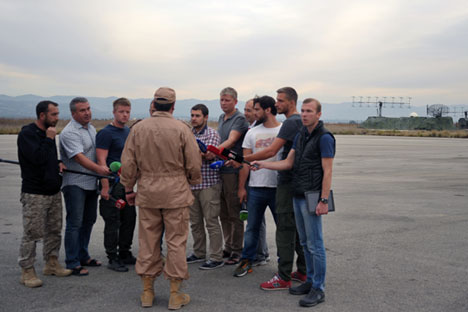
Rescued pilot of the Russian Air Force's Su-24 jet, Captain Konstantin Murakhtin, center, answers journalists' questions at Khmeimim Air Base in Latakia.
Ria Novosti/Dmitry VinogradovSu-24 navigator Capt. Konstantin Murakhtin, who was saved by the Syrian and Russian military after his bomber was shot down by the Turkish air force on Nov. 24, has said that Turkish planes opened fire on the Russian aircraft without warning, and emphasized that he wanted to continue to fight in Syria.
"Of course, I am looking forward to be discharged from hospital to immediately return to duty. I will ask the command to leave me at this air base – I should pay them back for my commander," said the pilot in an interview broadcast on the Rossiya 1 TV channel on Nov. 25.
Contrasting Ankara’s official statement that numerous warnings had been issued to the Su-24 before it was shot down, he said that Turkish F-16 fighters had not given any warning to the crew of the Russian bomber about the need to leave Turkish airspace.
"Neither by radio exchange nor visually. There was no contact at all," he told journalists.
"So we went on the combat course in normal mode. You need to understand what the speed of a bomber is and the speed of an F-16 is. If they wanted to warn us, they could have shown themselves by taking a parallel course. There was nothing. And the missile hit the tail of our aircraft suddenly, we did not see it in time to do an anti-missile maneuver."
On Nov. 25 Russian President Vladimir Putin a decree awarding the Order of Courage to Capt. Murakhtin. Marine Alexander Pozynich received the same award posthumously. Pozynich participated in the search and rescue operation and was killed when Russia's Mi-8 transport helicopter was hit by rebel fire.
The Su-24's pilot Oleg Peshkov, who was killed in the incident when militants opened fire as he was descending by parachute, posthumously received the Hero of Russia star.
The command of the Russian Armed Forces' operation in Syria reported on Nov. 25 that from now on all strike aircraft flights would be accompanied by a fighter escort. In addition, S-300 anti-aircraft missile systems will be moved to the Russian base in Syria.
Russian military expert and blogger Vladislav Shurygin claims the Turkish air force had been trying to catch and destroy Russian attack aircraft “for several days.”
"When our aircraft took off, the Turks immediately scrambled theirs, and at the approach of our fighter bombers to the area of the fighting, between four and six Turkish F-16s were constantly in the air," he wrote in his blog on Livejournal.com.
"Several times the Turkish command moved the closest pair to the border into firing position, but recalled them as they approached it, explaining these steps by 'accompanying' foreign aircraft," he wrote, though he gave no explanation of the sources on which he was basing such conclusions.
According to him, a day before the incident, Turkish fighters started locking on to Su-24s even before they approached Turkish airspace – though Shurygin did not explain where he got his information.
"The missile launch was carried out effectively over the border of Turkey and Syria, after which the Turkish F-16 flew into Syrian airspace for at least four kilometers," Shurygin wrote.
According to him, after landing, Capt. Murakhtin hid from militants in the forest, constantly moving from place to place and disguising himself, so the pursuers could not detect him.
"It is interesting that almost immediately a group of militants went from the nearby village to the area where the pilot was hiding, and began active radio communication, which suggests that Turkish interceptors immediately passed the information on the whereabouts of the pilot to the militants," Shurygin concluded in his posting.
Russian pilots that have shared a similar fate to Murakhtin include former Vice President Alexander Rutskoi, who was a pilot in the Soviet air force during the USSR’s war in Afghanistan in the early 1980s.
In August 1988, his Su-25 was shot down by the Pakistan Air Force's F-16 aircraft. Rutskoi ejected and was pursued for five days by Afghan mujahedeen fighters, who eventually took him prisoner. After that, he was exchanged for a Pakistani spy caught in the Soviet Union.
First published in Russian in Gazeta.ru
All rights reserved by Rossiyskaya Gazeta.
Subscribe
to our newsletter!
Get the week's best stories straight to your inbox